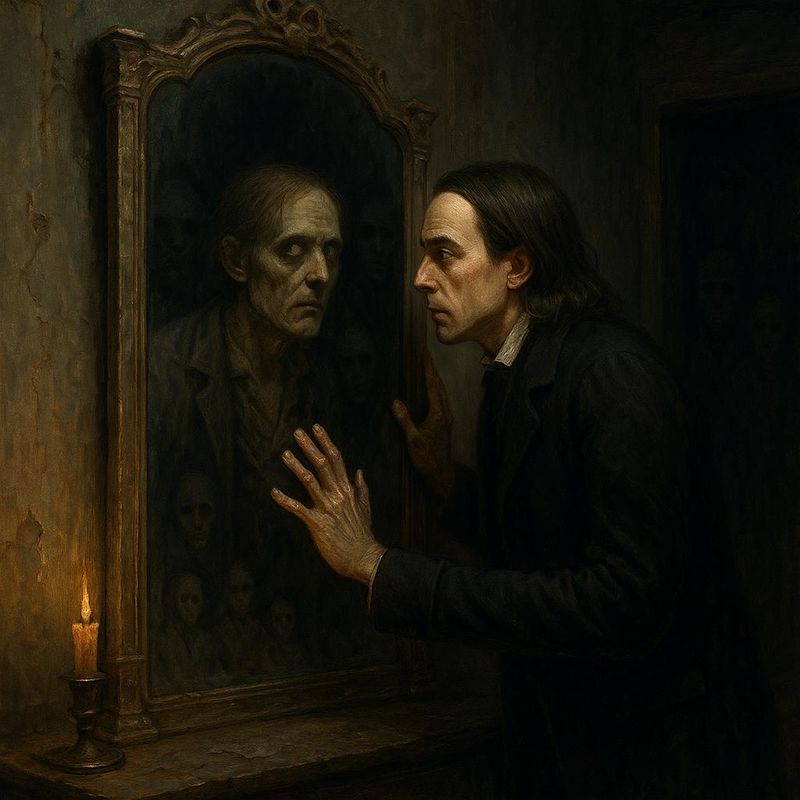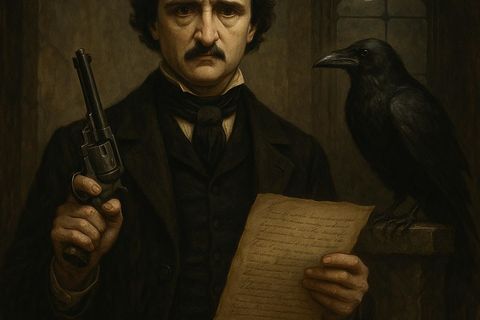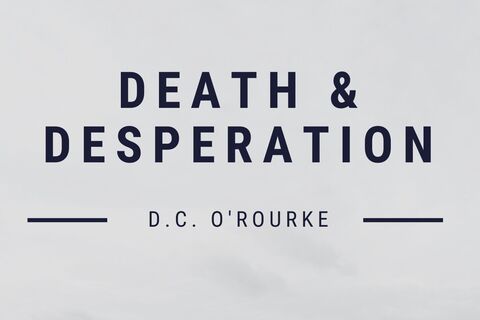The Murmuring Glass

I pray that whoever reads what follows will lend to me neither condemnation nor pity, but only patience, for every syllable has been torn from a mind that is unraveling like a burial shroud caught upon a coffin-nail. I have not slept in three nights; neither have I prayed, for God has turned His face from me, and I have not earned the comfort of His distance. I write in haste, by the trembling wick of a guttering candle, in a room that was once the warm cradle of my thoughts — a study filled with books, quills, sketches, philosophical investigations — now devolved into a fever-ridden den where shadows breathe with a hunger I do not dare ignore.
Though my hand quivers, I must begin where all tragedies find their seed: in curiosity, not in sin. For sin is deliberate, but curiosity is seduction.
My name is Nathanial Arkwright, and until recently I considered myself a man rational in mind, composed in temperament, and governed by the quiet dignity of solitary scholarship. I lived alone in a modest but comfortable house situated upon the outskirts of Wyndham, a town perpetually crowned with the melancholy scent of sea-fog drifting from the nearby cliffs. There, beneath the slanted roof and dim corridors of my dwelling, I found solace not in society, but in thought, in the sequestered communion between a scholar and the ghostly dust of forgotten truths.
It was upon the ninth day of October — a date I now believe cursed — that I became aware of the abandoned manor known locally as Marlowe House. The townsfolk avoided mention of it unless compelled by drink, and even then only in muttered tones, as though utterance might rouse something from its slumber. The house sat alone at the brink of Wyndham Cliff, its chimneys like broken fingers clawing skyward, its windows sealed behind the grime of three human generations. The estate had passed through so many hands — by death, bankruptcy, madness, and disappearance-that it had come to belong to no one, and thus to anything.
The fascination that stirred within me was gentle at first, like the slow tightening of a noose before the drop. I wished only to examine relics, nothing more — a harmless undertaking for a historian of melancholic curiosity. I believed the danger of such exploration lay only in dust, mold, and unstable floorboards.
How grotesquely foolish I was then.
On that fateful day, I made my way to Marlowe House. The wind whipped at my coat, bearing the scent of brine and early frost. The iron gate, though rusted nearly to dust, swung wide at my touch, giving voice to a moan not unlike that of a dying man easing into surrender. Through the overgrown garden — a wild snarl of thorns, weeds, and toppled statuary — I reached the once-grand entrance hall. The front door yielded with surprising ease, as though time itself desired my entry.
The interior was a mausoleum of memories. Cobwebs hung in draping folds like decayed funeral veils. The wallpaper, once a deep burgundy, now peeled in curling strips, revealing walls the color of grave-soil. A chandelier, blackened by age, dangled precariously above the central hall like a spider poised above its prey.
My lantern cast wavering light down the corridor, illuminating portraits on the walls — faces pale with dust, eyes disturbingly vivid beneath the grime. I passed through parlors, bedrooms, a library, a music salon — until, in a back hall where moonlight seeped through a broken shutter, I found it.
The mirror.
It stood nearly seven feet in height, taller than any man I had ever known, framed in tarnished silver engraved with patterns too distorted now to decipher. A single sheet of rotted cloth, once velvet, hung across its surface. Something — no, some feeling — compelled me to lift the cloth. And when I did, the air around me seemed to drop in temperature so abruptly that frost formed at the corners of the glass, though no breeze had entered.
In the dim glow of my lantern, I stared into the mirror — and my reflection stared back. But I swear upon every breath yet in my lungs that what gazed back at me was not wholly my reflection. My features were present, yes — the brow, the nose, the hollowed cheek — but my eyes looked graver, darker, filled with knowledge too heavy for the mortal form. It was like glimpsing the man I would become if despair could sculpt flesh.
I should have fled. Yet I reached forth and touched the surface.
It was warm — warm as living skin.
A tremor of horror rattled my bones, but fascination proved stronger. Without knowing how or why, I dragged the monstrous object from the mansion, strapped it to a hired cart, and brought it home under shrouded dusk. I told myself it was for study, for appraisal — for history.
No.
It was for destiny.
That night, the mirror remained standing against the wall of my study, still covered by the velvet rag. I attempted to sleep, but found my dreams invaded by a peculiar sensation — as though something had turned inside-out within my thoughts and now walked where only I should tread. I awoke thrice with the unsettling certainty that someone stood beside my bed, breath slow and measured.
At dawn I rose, my nerves taut, unable to endure ignorance. I returned to the study and removed the cloth.The mirror no longer reflected my study in its entirety. Instead, the background was… wrong. My reflection stood in a room that resembled mine, yet bore subtle, dreadful differences: the shelves were bare, the walls stained with water, the lantern extinguished, and the air filled with motes that drifted like ash rather than dust.
And — most terrible of all — my reflection smiled.
My mouth did not move.
Yet his — mine but not mine — curved into a ghastly, knowing grin.
I staggered back, heart aflame with terror and disbelief, but even in my panic, I noticed something else: there were shapes behind him, vague figures crowding the corners of that unnatural chamber.
Shadowy silhouettes.
Unmoving.
Watching.
“Who are you?” I whispered.
My reflection, still smiling, raised one finger to his lips in the universal command for silence.
Then he blinked — once — and his eyelids did not rise again. Instead, his skin — my skin — began to pale, his face slackening like wax near heat. Behind him, one of the silhouettes moved — only slightly — yet enough for me to understand the horror: The figures were not behind him. They were approaching.
Unable to endure further sight, I tore myself away, threw the cloth back over the glass, and fled the room as though flames chased me. The remainder of the day, I tried to reason, to rationalize, to assign all to nightmares or madness born of isolation. Yet every theory I constructed fell apart under the weight of my certainty: this mirror did not merely reflect — it revealed.
That night, I was awakened by tapping.
Tap… tap… tap…
Not against wood, or window, or floor — but against glass.
I dared not rise. My body trembled beneath the covers, every muscle locked. The tapping continued, each sound more deliberate, more insistent, as though fingernails dragged slowly across the inner surface — not of my window, but of something carried within my home.
When dawn finally bled into the room, silence returned. With trembling resolve, I approached the study once more. The cloth had fallen. The mirror was now uncovered. And I was not reflected in it.
The room appeared empty.
The floorboards, cracked.
The walls, rotted.
The lantern, absent.
In the center of the room — there, in place of where I should have been — stood a woman. Her gown was from some bygone era, stained with the deep brown of old wounds. Her hair hung in damp ropes across her face, and her skin sagged like parchment that had survived flood and fire alike. Her eyes, hollow pits of grief, met mine through the boundary of the glass.
She whispered — barely audible — “Free us.”
I stumbled backward, knocking over an inkstand. When I dared glance again, she was gone — but in her place stood another version of me: older, gaunt, with a rope-bruise encircling his throat.
He mouthed silent words: “Soon.”
Madness clawed at my mind. I placed blankets over the mirror, then dragged furniture to barricade it, though I knew such frail efforts would be mocked by whatever dwelled within. All that day, I felt watched. From windows, from corners, from the dark seams between floorboards. And at evening, I heard whispers — not aloud, but inside the air itself, as though breath carried language.
The whispers formed fragments:
“Door not mirror…”
“…inheritance of the forsaken…”
“…your face fits…”
“…the glass remembers…”
Sleep was impossible. I paced the house until candle-end, my sanity tethered by threads fraying faster than thought. On the third night, the tapping returned — louder, faster, as if dozens of fingernails now scraped tirelessly at the boundary. Driven by a torment beyond rational endurance, I seized a poker from the hearth, returned to the barricade, and smashed the mirror with every ounce of strength in my body.
The glass did not shatter with the shattering of mirrors.
It burst — like something alive.
Fragments flew across the room like flocks of metallic insects, clattering against walls, shelves, floor — not falling lifelessly, but skittering, like the legs of beetles. And in every single shard, no matter how small, I saw reflecting an eye. Not identical eyes — but eyes belonging to dozens, perhaps hundreds, of souls. Some wide with terror. Some narrowed with wrath. Some glassy with vacancy. Some belonging to me.
The fragments spread apart, moving unnaturally, positioning themselves around the study — like a circle.
A prison.
No — a ritual.
From the largest shard rose a voice: layered, despairing, legion.
“There must always be one in the glass.”
I froze, breath severed from will.
“Your reflection has already gone inside.”
A coldness unlike any winter touched the back of my neck, and in my peripheral vision, I saw — not a shadow — but a shape matching my height and form. I dared not turn, but I felt its face near mine, its breath matching my breath, its heartbeat slowing until it was no longer a rhythm, but a memory.
Hands — or what felt like hands — pressed against my back with the softness of grave-earth settling.
Another whisper:
“Go to where you already are.”
My knees weakened. My vision narrowed. My sense of self slipped like fingers losing grip on the edge of sanity. I fell forward. Not onto the floor. Into darkness. I do not know how long I remained unconscious — if unconsciousness applies when no body draws breath. For when I awoke, I found myself standing — though I had no memory of rising — inside a room exactly like my study but stripped of life. The shelves were bare. The walls were rotted. The air was thick with the scent of damp stone and long-extinguished candles.
My heart thundered.
At the far end of the room stood the mirror, whole once more. Within its surface, I saw my study — the true one — and my body, sprawled lifeless beside the scattered shards. A thin trickle of blood ran from my temple, as though the fall had cracked bone.
Beside my body stood another man — my reflection — who now breathed, now lived, now turned with my voice, my hands, my heartbeat. He — it — looked directly at me. And smiled with the warmth of someone savoring freedom. He lifted a hand in farewell, whispered words I could not hear, then covered the mirror with cloth. Darkness fell — a darkness so complete that even thought seemed too bright for it. There is no time here.
I do not hunger.
I do not breathe.
I do not die.
But I hear.
From beyond the cloth, faint at first, then clearer, voices murmur — new voices. A visitor? A buyer? A scholar like myself, seduced by the chill of unanswered questions? The final whisper that reaches me is unmistakably my voice — yet no longer mine:
“Curiosity must be fed.”
And so I wait. In this place where reflections rot into truth. Where souls press like fingerprints against the glass. Where there is no morning. Only the repetition of becoming.
If you are reading these words — beware.
Mirrors do not show what is.
They show what belongs to them next.



